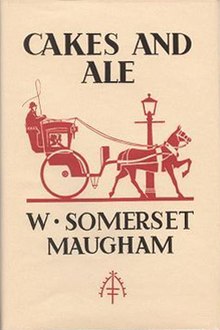Cakes and Ale

Cover of the first UK edition
|
|
| Author | W. Somerset Maugham |
|---|---|
| Country | United Kingdom |
| Language | English |
| Genre | Novel |
| Publisher | William Heinemann Ltd. (UK); Garden City Publishing Company, Inc. (US) |
|
Publication date
|
1930 |
| Media type | Print (hardback) |
| Pages | 308 |
Cakes and Ale, or, The Skeleton in the Cupboard (1930) is a novel by the British author W. Somerset Maugham. Maugham exposes the misguided social snobbery levelled at the character Rosie Driffield, whose frankness, honesty and sexual freedom make her a target of conservative propriety. Her character is treated favourably by the book's narrator, Ashenden, who understands that she was a muse to the many artists who surrounded her and who himself enjoyed her sexual favours.
Maugham drew his title from the remark of Sir Toby Belch to Malvolio in William Shakespeare's Twelfth Night: "Dost thou think, because thou art virtuous, there shall be no more cakes and ale?" Cakes and ale are also the emblems of the good life in the moral of the fable attributed to Aesop, "The Town Mouse and the Country Mouse": "Better beans and bacon in peace than cakes and ale in fear."
In his introduction to a Modern Library edition, published in 1950, Maugham wrote, "I am willing enough to agree with common opinion that Of Human Bondage is my best work... But the book I like best is Cakes and Ale ... because in its pages lives for me again the woman with the lovely smile who was the model for Rosie Driffield."
The story is told by a first-person narrator and well-to-do author, William Ashenden, who, at the beginning of the novel is suddenly and unexpectedly contacted by Alroy Kear, a busybody literary figure in London who has been asked by Amy, the second Mrs Driffield, to write the biography of her deceased husband, Edward Driffield. Driffield, once scorned for his realist representation of late-Victorian working-class characters, had in his later years come to be lionised by scholars of English letters. The second Mrs Driffield, a nurse to the ailing Edward after his first wife left him, is known for her propriety, and her interest in augmenting and cementing her husband's literary reputation. Her only identity is that of caretaker of her husband in life and of his reputation in death. It is well-known, however, that Driffield wrote his best novels while he was married to his first wife and muse, Rosie.
...
Wikipedia
